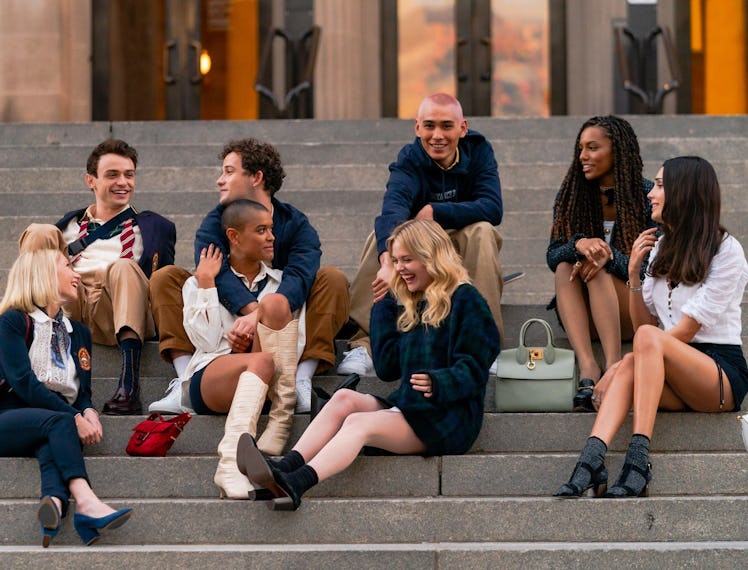A “Woke” Gossip Girl? Millennials Recoil at the Idea

Was Blair Waldorf aware of the Iraq War? That wasn’t a question the original Gossip Girl had much interest in answering, even as its first season and a half aired while George W. Bush was president. Indeed, it’s not even immediately clear if the characters ever realized Barack Obama had been elected. Funnily enough, Barack Obama was aware of Gossip Girl; he cracked a joke about the show within his first 100 days in office. The CW original was a glossy escape into a fantasy version of New York wealth aimed at audiences who had seen their first episode of Sex and the City in middle school (if not earlier) that managed to take over the cultural zeitgeist.
If there’s one political hot take to make about the original, it’s that a generation of teens who came of age in a world where terrorism, war, and economic collapse dressed up as moral panic dominated the news cycle didn’t have much patience for shows that didn’t acknowledge teenagers drank, did some drugs, had sex, and occasionally subjected each other to cruel mind games. No one watched the show in search of a deeper truth, but at least Gossip Girl wasn’t lying about what it was.
So hints that HBO Max’s upcoming reboot may be, for lack of a better term, a bit more “woke,” seems to have caused some outrage on the internet.
This development wasn’t a complete surprise. In some of the earliest set photos captured by paparazzi, one of the characters carries a tote bag from a real-life radical independent book store. And showrunner Joshua Safran officially acknowledged the new show’s interest in current social politics in a feature in Variety.
“These kids wrestle with their privilege in a way that I think the original didn’t,” he told the trade paper. “In light of [Black Lives Matter], in light of a lot of things, even going back to Occupy Wall Street, things have shifted.” The article adds that the characters are “aware of income inequality” and that “[t]hey’re (mostly) not rude to service workers.”
This caused something of an uproar on Twitter—not among those who hold onto their politics for dear life at the mere mention of anything being “woke” (i.e. performative Conservatives desperate for social media attention), but fans of the originals who feared the new version could completely miss the point.
Why the backlash?
Gen Z-focused reboots of Millennial culture are inherently going to set up something of a generation war. Riverdale avoided one because the Archie characters have existed since 1941, but studio execs still seem blind to the fact that rebooting shows beloved by people who are still young enough to be “very online” will court potential heated criticism.
More specifically, though, fans of the original seem cynical of a more socially aware rebrand of Gossip Girl in particular. If we were talking about, say, rebooting Degrassi: The Next Generation in similar terms, no one would bat an eye. That show enlightened Millennial teens to social issues long before they ever logged onto Tumblr. The heart of the franchise would demand it. Gossip Girl, however, was a show about overprivileged teens awash in affluenza. They were never supposed to be actual role models.
Three or four main characters from the original cast probably did think it said “RSVP” on the Statue of Liberty. There are dozens of ‘90s and ‘00s teen-centric shows that could pull off more enlightened reboots, but Gossip Girl, specifically, is not the most obvious candidate. It’s almost like trying to reboot Absolutely Fabulous with a sincerely body-positive, class-aware Edina Monsoon. It just wouldn’t work.
Presenting a new cast as suddenly morally aware seems like a tactic to avoid getting called out on Twitter, all the while safely squeezing every last dime out of an existing piece of intellectual property owned by already rich interests. So much corporate embrace of social justice talk is more about brand maintenance than it really is about effecting change. To be clear: many wary of the possibility of a socially aware reboot are not against being socially conscious. They’re more worried about those ideas being watered down into nothing and then dismissed as out of trend as quickly as last season’s Gucci.
But perhaps we’re all just being little gossip girls ourselves, here: taking little bits of information, making huge assumptions, and quickly disseminating them digitally just for the thrill of causing drama.
And in a new feature with Vulture, Safran expands on his view of the show’s new political outlook; he compares it (multiple times, actually) to Succession, and writer Hunter Harris affirms that at its heart, it “remains a show about clout-chasers and backstabbers growing up and growing apart, good sex, bad parents, and carrying the right handbag.”